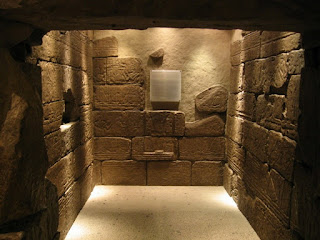MUSEUM INNOVATIONS
BY: CASSY KIST
It has officially been over a month since Nuit Blanche and now that we are halfway through the term I think it is an excellent time for reflection! One art piece I found innovative and intriguing was "The Merging" on display at OCAD University.
BY: CASSY KIST
It has officially been over a month since Nuit Blanche and now that we are halfway through the term I think it is an excellent time for reflection! One art piece I found innovative and intriguing was "The Merging" on display at OCAD University.
This 2D art mural by Nicola Verato is brought to life using an app designed by SE3D interactive, which could be downloaded onto your smartphone or used on the ipads that the University provided.
By focusing the ipad on the painting the image is stirred
into movement and viewers can move through and look around what appears to
be a 3D room. This gave the painting depth, merging
outsiders with a virtual world.
What would happen if museums used similar augmented reality applications to add context, movement, sound and
or even texture to artefacts?
Your phone or ipad would become a story telling treasure chest.
Your phone or ipad would become a story telling treasure chest.
Museums are already stretching their virtual reality
muscles; the Smithsonian has an app available for their Skin and Bone Hall at the ANHM. By downloading the app and using the exhibit's trigger images, visitors can see how the skeletons of animals and fish would have looked in the flesh.
 |
| AMNH Bone Hall. Source |
The Royal Ontario Museum has also been experimenting with augmented reality. If you visit the museum today make
sure to check out their fossilised T-Rex which has a quirky modification. A stationary ipad brings the T-rex to life with whom you can then take a selfie!
 |
| At the Royal Ontario Museum. Source |
 |
| Egyptian Tomb at the ROM. Source. |
This has made me consider the possibility of museums adding
virtual reality components to portions of their exhibit catalogues.
For instance, imagine a catalogue in which artefacts can be popped into 3D using an ipad or smartphone and examined from all angles. This would change the game of accessibility but also possession; how would it feel to examine a virtual piece in your own home?
For instance, imagine a catalogue in which artefacts can be popped into 3D using an ipad or smartphone and examined from all angles. This would change the game of accessibility but also possession; how would it feel to examine a virtual piece in your own home?
Individuals who tested the Disney colouring pages said they
felt more connected to the virtual characters. Could 3D apps connect museum
goers and catalogue pursuers with the objects and stories therein?
 |
Do I secretly want one of these for mid-semester stress
relief? Yes, yes I do.




No comments:
Post a Comment
Note: only a member of this blog may post a comment.